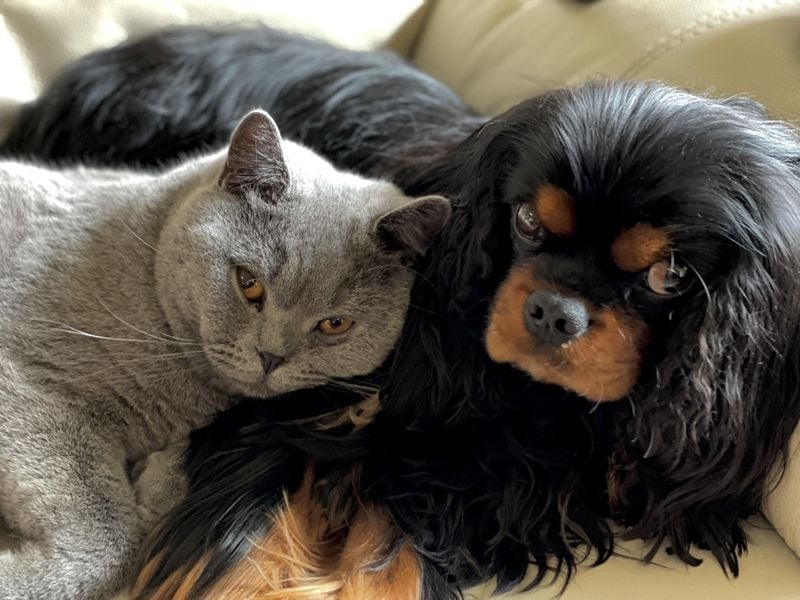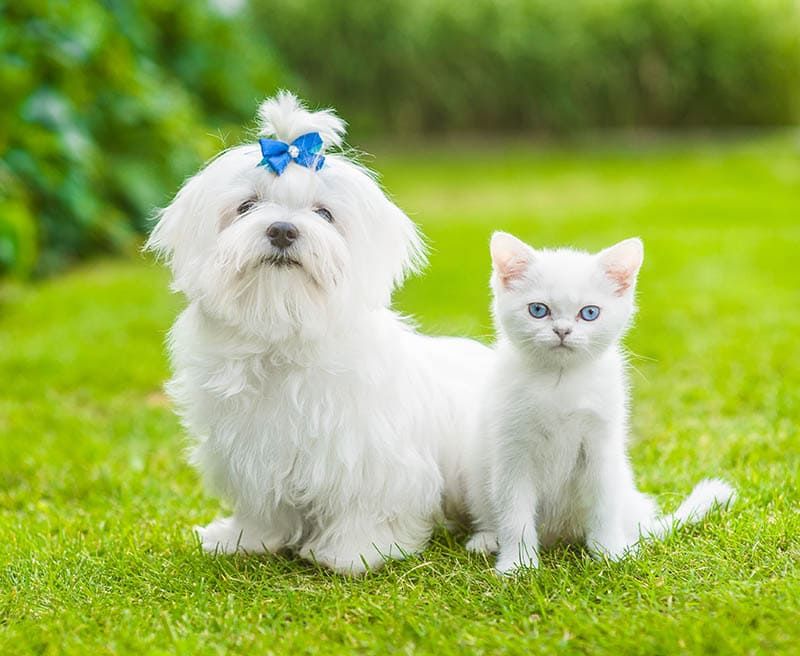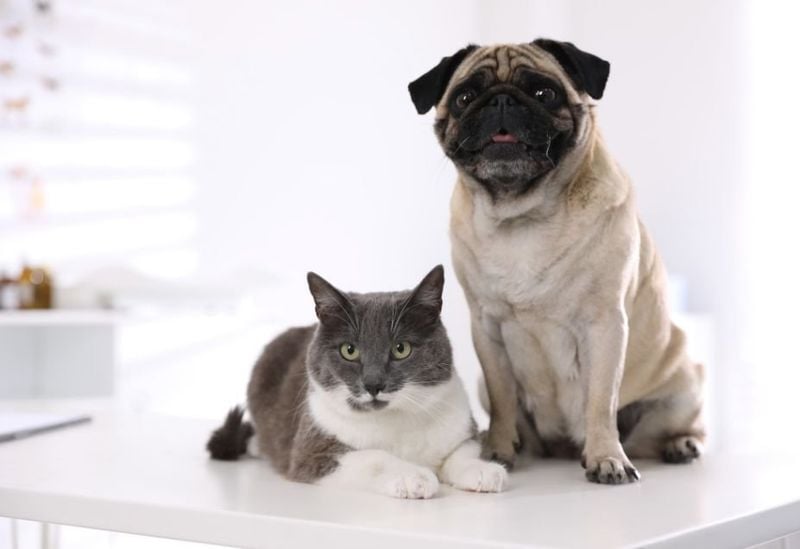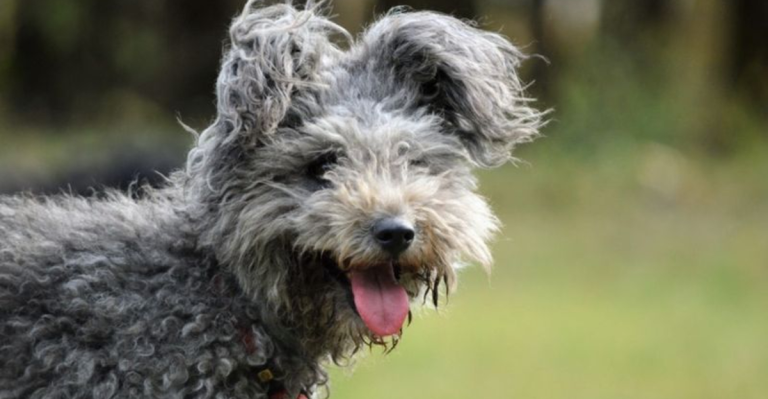11 Dogs That Treat Cats Like Roommates—and 11 That Treat Them Like Prey
Bringing home both a dog and a cat sounds like the beginning of a wholesome Disney movie—but in real life, it’s more of a high-stakes social experiment.
Some dogs are total cat whisperers, ready to curl up for a nap beside their feline friend or even share their favorite toy without a second thought.
Others? Let’s just say they’re more likely to see the family cat as a squeaky toy that doesn’t squeak—or worse, as something to chase like it’s the 100-meter dash.
While every dog is an individual and proper introductions can make all the difference, breed tendencies definitely play a role.
Some dogs are bred to herd, chase, or hunt—and your cat’s sudden zoomies might awaken instincts that even the best training can’t completely override.
On the flip side, other breeds are gentle, social butterflies that can’t wait to meet their new furry roommate (and maybe steal a nap spot on the windowsill).
Whether you’re a cat owner thinking of adding a pup to the mix, or a dog lover hoping to adopt a kitten, knowing which breeds are most likely to thrive—or clash—in a multi-pet household can save you a lot of stress (and maybe a few shredded curtains).
In this list, we’re diving into 11 dog breeds that tend to spell trouble when cats are involved, followed by 11 breeds that are practically feline-friendly from the start.
It’s part cautionary tale, part matchmaking guide, and 100% helpful for anyone trying to create harmony under one roof. Let’s take a look at the canine personalities that make for either adorable friendships or… fur-flying mayhem.
1. Greyhound
Chasing is their game, and Greyhounds excel at it. Known for their incredible speed, they often see smaller animals as something to pursue. Cats, with their quick movements, can easily trigger the Greyhound’s chase instinct.
Their history as racing dogs gives them a prey drive that’s hard to overcome in a household with felines.
While they might seem laid-back at home, the sight of a darting cat can awaken their inner racer. Despite their gentle demeanor with people, Greyhounds require careful supervision around cats.
Training and slow introductions might help, but many still struggle to resist the urge to chase, making cohabitation with cats challenging. Always consider individual temperaments before mixing these pets.
2. Jack Russell Terrier
This little dog comes with a big personality and an even bigger drive to hunt. Jack Russell Terriers are wired to pursue and their boundless energy means they’re always on the lookout for something to chase.
To them, cats might not be housemates but rather tiny squirrels on the run.
Their lively nature can spell trouble in a cat-friendly home, as they have been known to be relentless in pursuit. The Jack Russell’s tendency to tunnel and dig adds another layer of challenge if a cat attempts to hide.
While some may live peacefully with cats, it’s the exception rather than the rule. Patience and training are key, but these terriers are often more cat-chasers than cat-companions.
3. Siberian Husky

With their striking appearance and boundless energy, Siberian Huskies are captivating yet challenging companions.
Their innate predator instincts make them less than ideal housemates for cats. Huskies thrive on activity, and a quick-moving cat can easily become the focus of their attention.
Known for their intelligence, these dogs often require a lot of stimulation to prevent them from acting on their hunting instincts. While their loyalty to family is unquestionable, their interactions with smaller pets can be unpredictable.
Huskies need a lot of exercise and training to coexist peacefully with smaller animals. Unless they are raised with cats from a young age, they are generally considered a risk for feline friends.
4. Weimaraner
Weimaraners are sleek, energetic, and forever curious. Their lineage as hunting dogs leaves them with a strong prey drive that’s hard to ignore. Cats, with their lithe movements and elusive demeanor, often spark their chase instinct.
These dogs are known for their intelligence and need for physical activity, making them a handful in a home with smaller pets.
Though loyal and loving to their human families, Weimaraners may see cats as part of the quarry rather than part of the family.
Training and early socialization can help, but their natural instincts often prevail. Potential cat owners should consider this breed’s high energy and predatory nature before combining them with felines.
5. Alaskan Malamute
Big, strong, and built for the cold, Alaskan Malamutes are impressive canines with a distinct wolf-like appearance. Their size and strength make them capable of unintentional harm to smaller pets like cats.
A natural pack animal, the Malamute’s instincts drive them to assert dominance, which can be a challenge in a multi-pet household. Cats may find their boisterous behavior and powerful play style intimidating.
While they’re affectionate and loyal to their human families, Malamutes need extensive socialization to even consider a harmonious relationship with a cat. Their playful nature can sometimes be too much for a household with fragile felines.
6. Afghan Hound
The Afghan Hound is a picture of elegance with its long, flowing coat and regal demeanor. Despite their aloof appearance, these hounds are driven by sight and have a high prey drive.
Quick movements, like those of a darting cat, are almost irresistible.
Known for their independent nature, Afghan Hounds can be a challenge to train. Their aloofness may translate to indifference or competition with feline housemates.
Though they bond deeply with their human companions, their relationship with cats is often more strained.
For those considering an Afghan Hound, it’s crucial to monitor interactions with smaller animals closely. Their instinctual chase drive can complicate cat coexistence.
7. Dachshund
Small in stature but mighty in spirit, Dachshunds were originally bred to hunt badgers and other burrowing animals. Their lively and curious nature means they’re always ready to explore, sometimes at the expense of feline peace.
Though they may appear charming and harmless, Dachshunds have a strong prey drive that can be triggered by a cat’s sudden movements. Their instinct to dig and tunnel can make them relentless in pursuit.
While some Dachshunds may live amicably with cats, individual temperaments vary widely. Early socialization is key, but their hunting instincts often make them more of a playful nuisance to cats than a companion.
8. Basenji
Basenjis bring an intriguing mix of independence and curiosity to any household. Known for their lack of bark, these dogs communicate in other vocal ways, often surprising to those unused to their yodel-like sounds.
Their aloof demeanor coupled with a high prey drive makes them challenging companions for cats.
Often, they view cats as interesting puzzles rather than peers. Their quick reflexes and desire to chase can turn a peaceful home into a game of cat and mouse.
While the Basenji’s intelligence makes them a fascinating pet, cohabitation with cats requires constant vigilance. Early socialization may help, but their instincts are strong and often override training.
9. Irish Wolfhound
Gentle giants with hearts as big as their hefty builds, Irish Wolfhounds are renowned for their calm demeanor towards people. However, their size and hunting lineage mean cats might not always feel safe around them.
Though they are typically mild-mannered, their natural instincts to pursue smaller animals persist. A cat’s quick movement can unintentionally trigger these instincts, making close supervision necessary.
The Wolfhound’s history as a hunter of large game means it’s crucial to consider individual temperaments. Training and controlled introductions to cats are essential, but their sheer size can be a daunting factor for feline friends.
10. Rhodesian Ridgeback
With a legacy as formidable lion hunters, Rhodesian Ridgebacks command respect and awe. Their courage and protective instincts are unmatched, but these traits can be overwhelming for smaller animals like cats.
Their strong-willed nature and high prey drive require experienced handling, especially in mixed-pet households. Cats might inadvertently challenge this dog’s instincts, leading to tense interactions.
Known for their loyalty and strength, Ridgebacks need significant training and socialization to coexist peacefully with cats. While they may guard a family with devotion, their relationship with smaller pets is often more complex.
11. Australian Cattle Dog
Australian Cattle Dogs are the epitome of hard-working canines, always ready to herd anything in sight, including household cats. Their unmatched energy and drive can be overwhelming for more sedentary pets.
Cats may find their herding behavior intrusive as the Cattle Dog attempts to “organize” anything smaller than themselves. These dogs are tenacious and require lots of mental stimulation, making them a handful in any home.
While they’re loyal and protective towards their human families, their relationship with cats can be contentious. Proper training and socialization can help manage their instincts, but their herding drive often remains strong.
On the flip side, these next 11 breeds are known for their easygoing nature and cat-friendly vibes.
12. Golden Retriever
Golden Retrievers are renowned for their gentle and friendly disposition, making them perfect pet companions. Always eager to please, they often extend their friendliness to cats, engaging them in play rather than pursuit.
With their easygoing temperament, Golden Retrievers are less likely to see cats as prey. Instead, they approach them with curiosity and a wagging tail. They thrive in environments where they can form bonds with other animals.
Due to their adaptability and affectionate nature, many homes have found success in introducing Goldens to feline friends. Their patient demeanor often wins over even the most aloof cats, leading to harmonious cohabitation.
13. Cavalier King Charles Spaniel
These lap-loving companions are the epitome of affection. The Cavalier King Charles Spaniel is small enough to cozy up with a kitty and sweet-tempered enough to win over feline hearts.
They crave companionship, often looking to other pets for interaction. With their gentle demeanor, they respect a cat’s boundaries, making them ideal housemates in a multi-pet home.
Known for their adaptability, Cavaliers are well-suited to a variety of living situations, often befriending cats with ease. Introductions should be managed carefully, but their friendly nature usually leads to quick acceptance from feline companions.
14. Labrador Retriever
With a sunny disposition and a heart full of warmth, Labrador Retrievers are the quintessential friendly dog. Their amiable nature extends to cats, whom they often treat as curious companions rather than competition.
Labs are known for their sociable and adaptable character, making them one of the easiest breeds to introduce to a cat-filled home. Their playful energy and non-threatening demeanor often win over even the most skeptical feline.
Whether chasing a ball together or napping side by side, Labradors and cats frequently form a bond built on mutual respect and playfulness. With the right introductions, their friendship can be a joyful sight.
15. Papillon
Light on their paws and full of curiosity, Papillons bring a gentle energy to any household. Their small size and friendly nature make them less intimidating to cats, often leading to harmonious interactions.
Papillons are more interested in exploring and playing than in asserting dominance, which can put feline housemates at ease. Their eagerness to engage with other pets fosters a friendly environment.
With their butterfly-like ears and bright demeanor, Papillons are a charming addition to a multi-pet home. Their gentle curiosity often leads to playful exchanges with cats, making them delightful companions.
16. Bichon Frise
Fluffy and full of life, Bichon Frises are like living, breathing teddy bears. Their playful nature and lack of aggressive instincts make them ideal companions for cats.
Known for their charm and cheerful disposition, they often see cats as fellow playmates rather than rivals. Their light-hearted approach to interaction ensures peaceful cohabitation with feline friends.
While introductions should be handled with care, Bichons usually adapt quickly to sharing space with cats. Their playful antics can bring joy to any home, making them a perfect fit for multi-pet families.
17. Poodle (Toy, Mini, or Standard)
Poodles, whether Toy, Mini, or Standard, are known for their intelligence and adaptability. These traits make them excellent companions for cats, as they adjust their behavior to suit feline temperaments.
Their eagerness to please humans often translates to peaceful interactions with cats. They’re quick to learn and respect boundaries, fostering a harmonious living environment.
With their elegant appearance and gentle nature, Poodles seamlessly integrate into homes with multiple pets. They enjoy engaging in playful antics with cats, often leading to endearing friendships.
18. Collie
Collies, with their stunning coats and intelligent eyes, are synonymous with loyalty and trainability. Their natural herding instincts are coupled with an innate desire to include everyone as part of their pack, including cats.
While they may try to herd their feline friends, they do so with a gentle touch, often earning the cat’s respect and friendship. Their patient nature allows them to wait for a cat’s trust, which they often gain quickly.
Collies thrive in environments where they can work and be part of a family dynamic, making them wonderful companions for households with cats.
19. Maltese
Delicate and delightful, the Maltese is a gentle soul that often looks more like a plush toy than a dog. Their calm disposition and small size make them less intimidating to cats, encouraging friendly interactions.
Though they may be initially shy, Maltese dogs are quick to adapt to living with feline friends. Their gentle nature means they are more likely to be intimidated by a cat than to challenge it.
This breed’s serene presence is valuable in a multi-pet home, where their harmonious energy allows them to coexist peacefully with cats, providing companionship without conflict.
20. Boston Terrier
Known as the “American Gentleman” for their tuxedo-like coat, Boston Terriers are sociable dogs with a playful spirit. Their friendly nature usually makes them a hit among cats, who enjoy their non-threatening demeanor.
Boston Terriers are more interested in joining in on fun than creating chaos, making them great candidates for feline friendship. Their clownish personality adds humor and warmth to any multi-pet household.
With their compact size and good-natured attitude, Boston Terriers often find themselves welcomed by cats, leading to delightful play sessions. Their ability to adapt and entertain makes them ideal companions in a diverse pet environment.
21. Pug
Pugs, with their charming wrinkles and joyful snorts, are known for their love of lounging. Their laid-back attitude often translates to easy friendships with cats, who appreciate their gentle companionship.
Content to nap through the day, Pugs see feline friends as perfect snuggle buddies. Their easygoing nature and love for comfort make them ideal partners for cats who prefer peace over play.
The Pug’s ability to adapt to various living situations allows them to fit seamlessly into homes with multiple pets. Their warm and affectionate demeanor often wins over even the most reserved cats.
22. Sheltie (Shetland Sheepdog)
Shelties, known for their intelligence and beauty, are gentle dogs with a knack for understanding. Their sensitive nature makes them respectful companions to cats, often earning trust quickly.
While they possess herding instincts, they rarely apply them aggressively, preferring to form bonds with feline housemates. Their affectionate nature allows them to coexist peacefully, providing comfort and companionship.
Shelties thrive in environments where they can engage with both people and pets, making them wonderful additions to cat-loving families. Their gentle demeanor and willingness to please create a harmonious household.



























